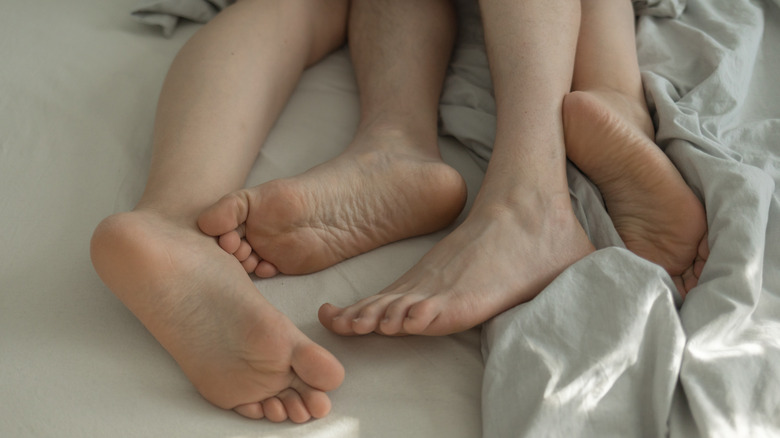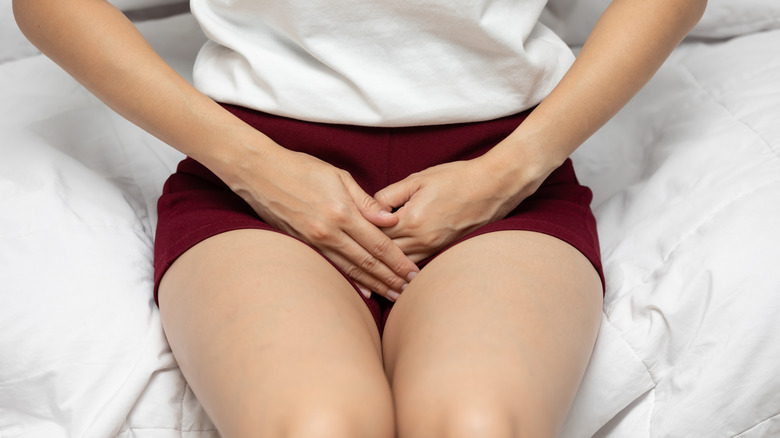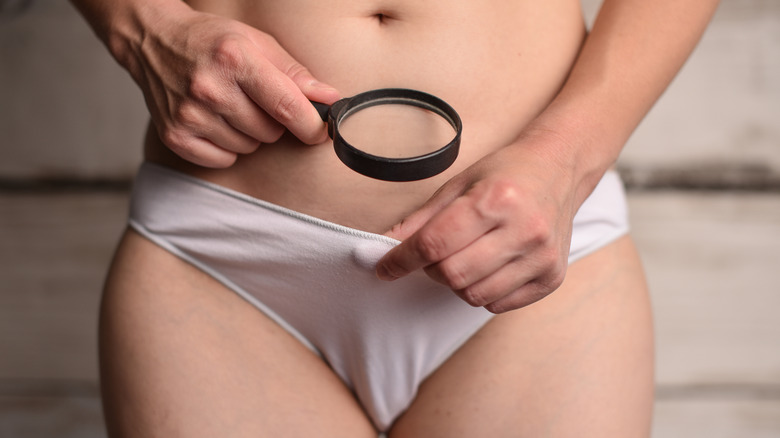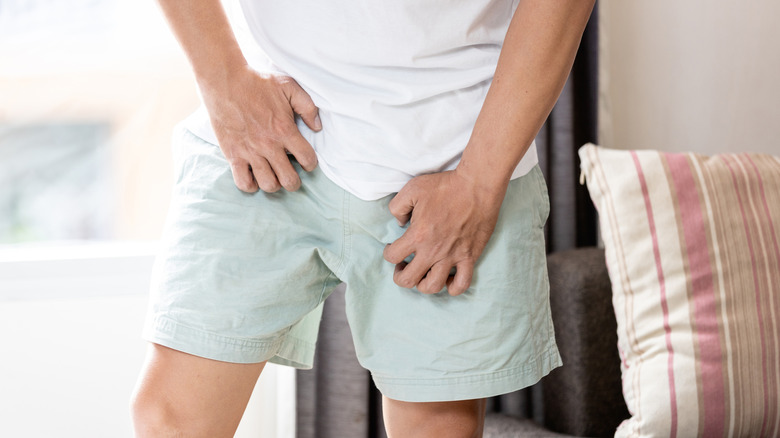After-Sex Warning Signs You Should Never Ignore
The post-sex atmosphere is usually one of love, trust, and good vibes. This is partially thanks to the release of oxytocin, a hormone released during orgasm (via WebMD). Also known as the "love hormone," oxytocin can lower levels of stress, bring down anxiety, and help build trust and connection. It can also promote good health, as people who have healthy sex lives have been shown to live longer than those who don't.
But, for all of the good feelings that a sexual encounter can produce, there can be downsides as well. Some people can experience sadness, depression, or anxiety after sex. According to PsychCentral, this is a condition known as postcoital dysphoria and can also be triggered by the fluctuation of hormones, including oxytocin and dopamine, as well as other issues such as relationship problems or unresolved past sexual trauma. There are other warning signs that can crop up after sex, and definitely should not be ignored.
Bleeding
According to WebMD, approximately 9% of women can experience postcoital bleeding, which means it's not always an immediate cause for concern. It can be caused by anything from a lack of lubrication to too much friction during sex. You could also experience bleeding if you have sex either at the beginning or end of your period. If it's just light spotting, there's probably nothing to worry about. However, if the bleeding is heavy or persists for longer than a few days, it could be a sign of something more serious.
Men can also experience bleeding after sex, particularly in the form of a condition known as hematospermia, or blood in the sperm (via Medical News Today). There can be a number of causes for this condition, although few are ever serious. It could be caused by a ruptured blood vessel in the prostate or seminal vesicles, or possibly a urinary tract infection or a sexually transmitted disease. If the bleeding is persistent or if you have concerns of any kind about what could be causing it, you should consult your doctor immediately.
Pain
Pain during or after sex is known as dyspareunia and can be triggered by a number of causes, ranging from physical to psychological (via the Mayo Clinic). A lack of proper lubrication can be one reason why someone experiences painful penetration. This can be caused by a drop in estrogen levels due to menopause, or even a reaction to certain medications, such as antidepressants or blood pressure treatments. If the pain is deeper, it could be a sign of a more pressing condition, such as endometriosis, pelvic inflammatory disease, ovarian cysts, or a prolapsed uterus.
There could also be emotional factors that cause painful intercourse, according to the Kernodle Clinic. People who suffer from anxiety, depression, or body image issues may see their levels of cortisol and trigger pain during sex. Additionally, Johns Hopkins notes that women who are survivors of sexual abuse and trauma may equate sexual activity with pain. As a result, they may tense up involuntarily and experience pain.
Burning during or after urination
In most cases, peeing after sex can be a good thing, according to Medical News Today. Sex can transmit bacteria to the urethra, and post-sex peeing can help flush that bacteria out and prevent urinary tract infections, or UTIs. This is particularly beneficial for women, who are up to 30 times more likely to develop urinary tract infections than men.
However, sometimes peeing after sex can be an uncomfortable, almost painful experience. According to Everlywell, painful urination can be triggered by a UTI, but it could also be a sign of a sexually transmitted infection such as chlamydia, gonorrhea, or genital herpes. It could also be the result of an allergic reaction to products used during sex, including condoms and lubricants. People who have a latex allergy may experience such symptoms as itching, redness, and swelling in addition to painful urination. If you have these symptoms, or painful urination in general that persists for more than two days, it's a good idea to contact a healthcare professional and seek treatment.
Discharge
Both men and women can experience some form of discharge during sexual arousal and after sex (via Medical News Today). Women can experience a discharge of fluid during foreplay, and, in some cases, up to half of women may even ejaculate during sex, with fluid being expelled through the urethra. However, if the discharge has a foul smell, or is clumpy or discolored, it could be a sign of a yeast infection or bacterial vaginosis.
Men can also experience penile discharge, usually during arousal (via Healthline) in the form of pre-ejaculate. This is a clear fluid that is secreted from the tip of the penis that can help clear out the acids from urination to aid in the survival of sperm and also lubricate the penis for sex. In some cases, however, men can experience a greenish or yellowish discharge, which could be a sign of urethritis, a condition that could be a sign of a sexually transmitted disease such as chlamydia, herpes, or gonorrhea.
Vaginal dryness or pain
The vaginal lining is normally lubricated with fluid, which helps keep the lining thick and pliable (via Cleveland Clinic). Vaginal dryness occurs when the tissues become dry, thin, and poorly moisturized. Vaginal dryness affects many women at some point in their lives. It is a symptom that can be caused by low hormone levels, certain medications, and even breastfeeding.
According to Dr. Nicole Stamatopoulous, vaginal dryness is most common among menopausal women due to changes in hormone production, particularly a decrease in estrogen that leads to the thinning of the vaginal walls. Vaginal dryness can cause pain when sitting, exercising, urinating, and even during sex. Women who suffer from vaginal dryness frequently experience pain during intercourse. This is because without sufficient lubrication, penetration causes friction, which can lead to pain or a burning or stinging sensation. If vaginal dryness persists for longer than a few weeks, if you have unusual bleeding or discharge after sex, or if over-the-counter treatments such as vaginal moisturizers and lubricants do not provide relief, be sure to contact your doctor.
Dizziness
Dizziness after sex can have a simple explanation such as hyperventilation, vertigo, dehydration, or hunger (via Medical News Today). It could also be due to postural orthostatic tachycardia syndrome, which is when a person's heart rate increases suddenly when they change positions or stand up too fast. This increase in heart rate can cause dizziness or even fainting in some instances. In addition, there are powerful hormonal swings due to the combination of hormones and neurotransmitters that are produced during sex. These chemicals can cause dizzying feelings of exhilaration. As the body comes down off the post-sex high, some people can also feel dizzy.
Other more serious causes of dizziness after sex include high or low blood pressure, stroke, and heart issues, according to Healthline. In addition, some patients can experience what is known as an orgasm headache, with subsequent dizziness. This can present itself as a sudden headache that comes on very strong, immediately following orgasm, and can last for anywhere from a few minutes to up to 72 hours.
Persistent or painful erections
For men, pain during an erection is something that should never be ignored. Urology Associates Medical Group reports that erection pain can be caused by a problem with blood flow to the penis, and can be triggered by a number of conditions. These include blood disorders, penile trauma, a urinary tract infection, or a reaction to prescription medication or recreational drugs. In serious cases, according to the Mayo Clinic, a man can develop Peyronie disease. This is a condition in which scar tissue forms in the penile tissues and results in painful, curved erections and can lead to sexual dysfunction and erectile problems.
Erectile pain can also be triggered by a condition known as priapism, which is an erection that does not subside (via WebMD). It can be triggered by erectile dysfunction medications, blood disorders, or even COVID-19. If you have an erection that lasts for four hours or longer, it's important to seek medical attention immediately.
Rashes or hives
It is not unusual to experience some itching after sex; this is due to too much friction from not enough lubrication (via Healthline). In most cases, the itching is both mild and temporary, usually clearing up with no outside intervention. However, when the itching becomes persistent or too much to ignore, it could be an indicator of a more serious condition, such as a yeast infection, a sexually transmitted disease, or some kind of allergic reaction.
Allergic reactions from sexual activity can be caused by a number of things, according to The Health Site. A latex allergy occurs when one has a reaction to the type of rubber commonly found in condoms and occasionally sex toys. It can cause rashes, burning, and itches, and the longer the exposure lasts, the worse it can get. In addition, women can experience an allergy to semen, which can make sex difficult. In these cases, male partners can wear a condom, or the couple can attempt desensitization via regular sex.
Shortness of breath or chest pain
Experiencing shortness of breath after sexual activity can be concerning. According to the Respiratory Therapy Zone, it could be triggered by the physical exertion of sex itself. As the heart rate rises and muscles are worked during sex, the body needs more oxygen, which can lead to one feeling short of breath after the fact. It could also be triggered by stress. Worrying about the relationship or having anxiety over sexual performance can lead to shallow breathing and a feeling of gasping for air. In most cases, your breathing should return to normal after a period of recovery, but if symptoms persist, you should consult your doctor.
A person who has asthma could experience a flare-up of symptoms after sex, given the vigorous physical activity of the act. According to a 2019 study published in BMJ Open Respiratory Research, asthma attacks, as well as the fear of sex triggering an attack, can have an impact on intimacy between partners. Allergy Tampa says that asthma patients should be on the lookout for telltale signs during sex (e.g., wheezing, coughing, or tightness in the chest) and stop immediately if those symptoms crop up.










